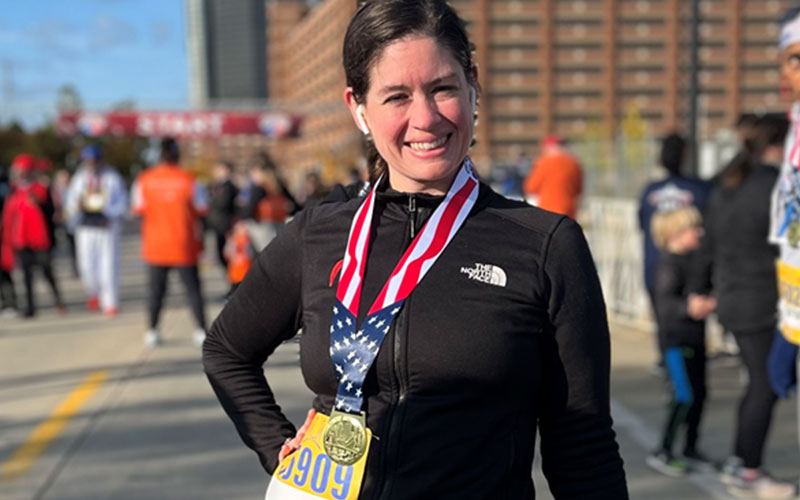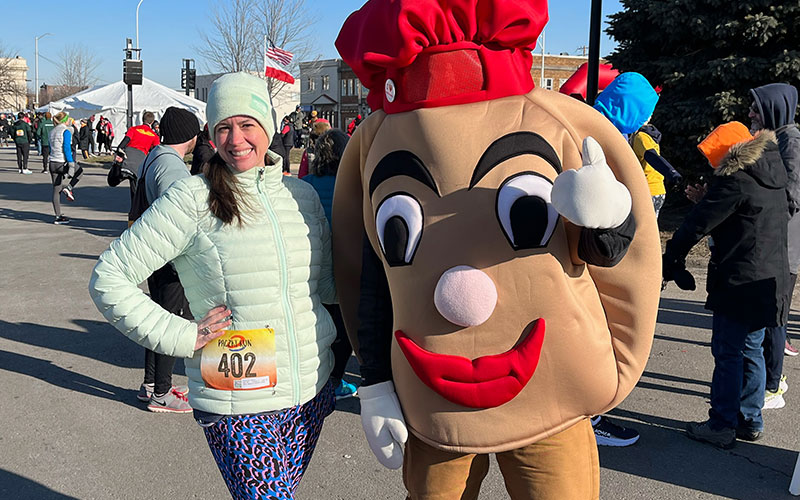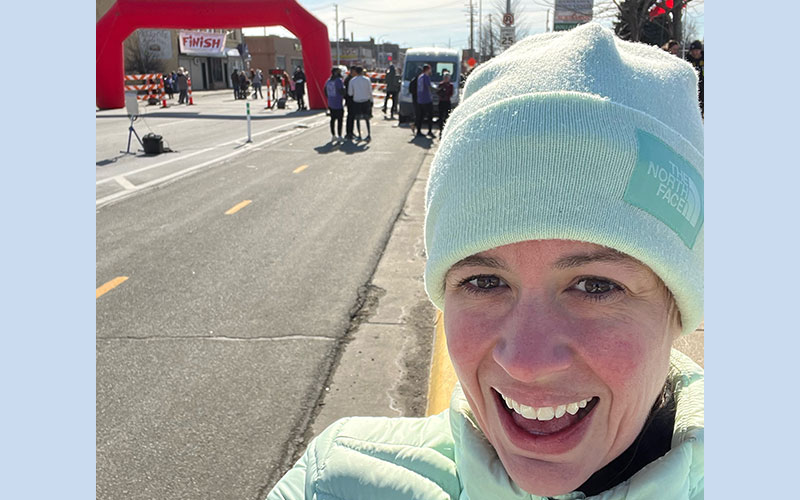A Dramatic Change
Nancy Cummins was only 34 when she was referred to Henry Ford Health and diagnosed with heart failure. It came as a complete shock.
“There was no known cause,” says Nancy, a Detroit resident and certified public accountant who is now 39. “While I have some family members with some heart issues, I had never experienced any major symptoms myself. It’s possible that some viral infections I had in previous years caused it.”
But once new symptoms arrived, they progressed rapidly.

“I started getting extreme shortness of breath, couldn’t walk even short distances and retained fluids,” Nancy says. “I just felt like my body didn’t work right.”
Nancy met with her advanced heart failure team at Henry Ford Hospital and was placed on medication to help with her symptoms. She also participated in Henry Ford’s cardiac rehab program for 12 weeks. However, her symptoms kept getting worse, and in June 2020, her cardiologist, Jennifer Cowger, M.D., recommended Nancy have a left ventricular assist device (LVAD) implanted. An LVAD helps a heart weakened by failure pump blood to the rest of the body.
Cardiac rehab, PREVENT and weight management programs
An LVAD can also serve as a bridge treatment until a person with heart failure is able to get a transplant. However, in Nancy’s case, her BMI, or body mass index—a measure of body fat based on height and weight—was too high to make her a heart transplant candidate.
“I knew I had to make my health my number one priority,” Nancy says. “After getting my LVAD, I was excited to do cardiac rehab again and start to get my strength back after being sick for so long.”
Nancy attended cardiac rehab three days a week for 12 weeks. During this time, she participated in monitored, medically supervised exercise sessions with exercise physiologists and also attended educational lectures on nutrition and heart disease. Dr. Cowger also referred Nancy to the Henry Ford Health weight management program.
“This was really helpful to me,” Nancy says. “Dr. Dennis Kerrigan, who runs the program, really wants people to succeed.”
Nancy met with the weight management team, which included both clinical exercise physiologists and dietitians who put Nancy on a healthy diet and exercise plan.
“The program was easy to follow and I learned a lot from talking with the nutritionists,” Nancy says.
“Nancy was one of the first patients with an LVAD we worked with in our weight management program,” Dr. Kerrigan says. “Historically, patients with an LVAD have a very difficult time losing weight. However, Nancy was very determined, and the top-notch support she received from Dr. Cowger and the advanced heart failure team and our team in preventive cardiology was a true display of multidisciplinary care at its best.”
A few months after starting the weight management program, Nancy also joined Henry Ford Health’s PREVENT (Prevention through Exercise and Education) Program. PREVENT participants exercise in a medically supervised area under the guidance of exercise physiologists much like they did in cardiac rehab, but are taught to become more independent with their exercise and learn how to truly “own” it. PREVENT participants have access to group fitness classes that include small group guided strength training (something Nancy actively participated in as well)—and create a rapport with the staff that further advances their fitness goals and lifestyle changes through motivation and education.
“PREVENT is great,” Nancy says. “All of the instructors and exercise specialists want people to be in the best health they can be. It’s also a community, which helped keep me motivated, because I would see the same people all the time.”
After completing both the weight management and PREVENT programs, Nancy reduced her BMI to be in the normal range, and has been able to keep the weight off since then. With this dramatic change, she was also eligible to get added to the heart transplant waiting list.
A new goal

While she was in the PREVENT program, Nancy started running on a treadmill.
“I’ve never really been super athletic,” Nancy says. “In high school, I took dance classes and ballet but wasn’t into organized sports. In PREVENT, the treadmill was something I could do consistently. I started off pretty slow with running, only a minute or two at a time, but after a while, I could do more and more.”
She kept working at increasing her endurance and, one day, Dr. Kerrigan noted there was a group of people at Henry Ford Cancer who are in the ExCITE exercise program, and who were planning on running the Detroit Free Press Marathon 5K. He suggested that Nancy do the same.
“It was good to have a goal to work toward,” Nancy says. “In the Spring of 2022, I got into a racing mindset, then started training in July.”
In October, Nancy ran the 5K. After she finished, she texted her care team: “I couldn’t have done it without all of you at cardiac rehab! And I may have been #996, but in the category of people with LVADs, I think I’m #1, lol!”
In February 2023, Nancy ran her second 5K, the Packzi Run in Hamtramck.
“I was less nervous because I knew that I could finish it,” Nancy says. “This was more about having fun and enjoying the race atmosphere.”
Now that she’s got two races under her belt, Nancy is already planning the next one.
“I talked to one of my girlfriends, and she ran her first 5K last year, too,” Nancy says. “We’re looking at running one together in the spring. Both our names are Nancy, so we’ll be ‘Team Nancy.’”
Committing to a healthy lifestyle with an LVAD

Running is just one of the ways Nancy is enjoying her new life with an LVAD.
“I live by the Dequindre Cut,” Nancy says. “Now I look forward to walking to Eastern Market and other areas in the city. Also, traveling. Before having my LVAD, even walking through the airport was difficult for me. But this past summer, I visited one of my friends in New York City. I’m doing 25,000 steps a day, and I’ve never felt in better shape. I’m also serving on a board, doing other volunteer work in the community and going to musicals and concerts. I don’t feel like I have any limitations at all.”
This year, for Nancy’s 40th birthday, she’s planning a trip to Paris.
“I know I’ll be able to walk around, do all of the stairs and get the full experience, because I’ll be in such good shape,” Nancy says.
As she looks back over her treatment journey at Henry Ford Health, Nancy is reflective—and grateful.
“People might have a picture in their mind of a person with a chronic illness living a sad life, but for me, it comes down to my great care team,” she says. “With their help, I have been able to live a very full life, and my life has changed completely. People tell me all the time that I am living my best life.”
.svg?iar=0&hash=F6049510E33E4E6D8196C26CCC0A64A4)

/hfh-logo-main--white.svg?iar=0&hash=ED491CBFADFB7670FAE94559C98D7798)


